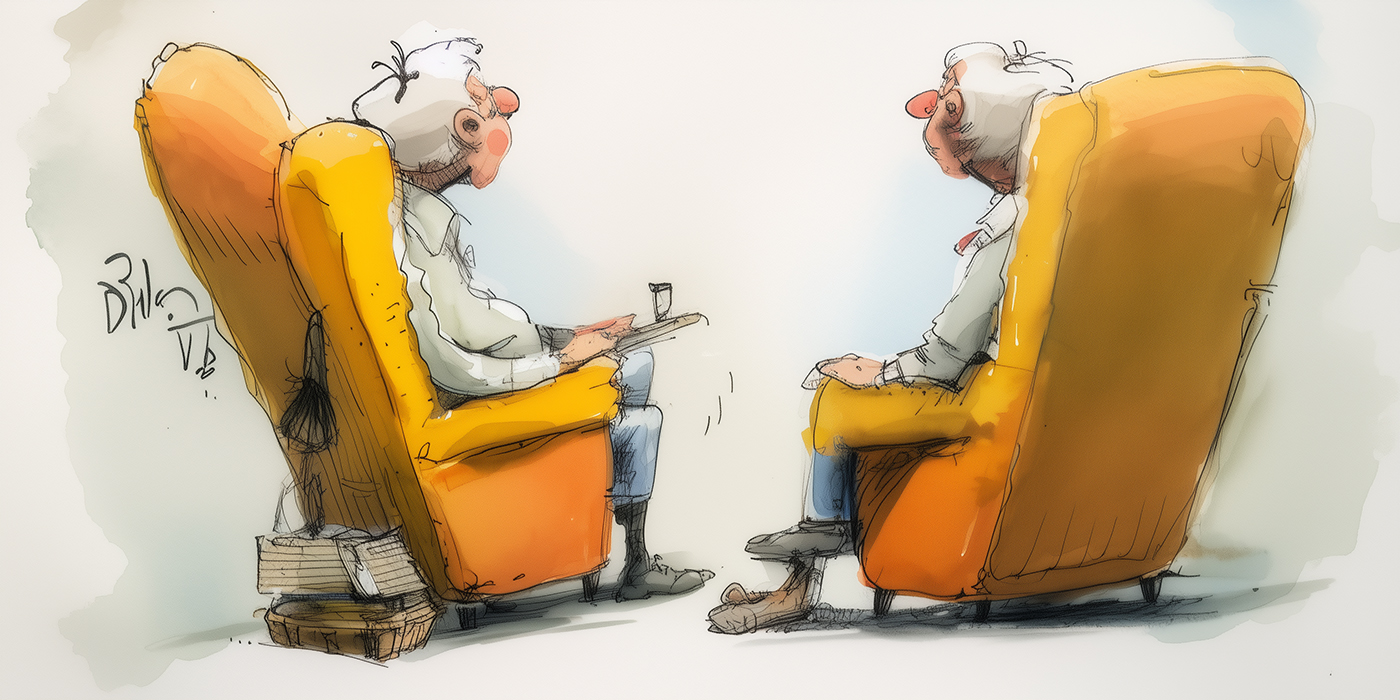ESSAY interviewed old-timer Art B., Georgia, USA
Thank you for your time, Art. Could we start by asking how old you were when you joined SA and the length of your sobriety?
I was 44. I’m 80 now, with 35 years of sobriety. When asked how does one stay sober for 35 years, I say: “One day at a time, keep surrendering lust, and one day at a time, don’t die!” I’ve been blessed with the gift of sobriety and with longevity.
How long were you struggling with the addiction and what “remedies” did you try?
In early adolescence, I felt I wasn’t like other kids. I wasn’t “normal.” I was obsessed with deviant fantasies. I didn’t know the word “deviant,” but I knew the word “pervert,” and that’s the word I labeled myself with. I didn’t want to be that way, but I didn’t know a way out. I kept telling myself, “I’ll figure this thing out.” I tried to do it in my head. I spent decades trying to figure it out. I never did figure it out.
As to remedies, I prayed, went to clergy, tried therapy. I got into my first marriage hoping it would make me normal. I continued to be stuck in the same cycle of obsessive fantasy and acting out.
Eventually, there were two things that prompted change in me: marriage counseling and the fellowship of Alcoholics Anonymous. My first marriage was rough because I was a raging sexaholic, but the counseling we resorted to helped me to see how rigid and controlling I was.
I stumbled into AA because I attended an open meeting with a family member who had a drinking problem; I went largely out of curiosity and was surprised to see those AA members with much more spiritual life than I could have imagined for myself. I qualified as an Al-Anon, of course, because of my family connection. I attended Al-Anon, but I attended many more AA meetings. I’m not an alcoholic, but I could attend open meetings—and I did, lots of them, over ten years!
I wasn’t clear in my mind why I kept going to AA. Looking back at it, however, I can see that the meetings started to open me up. The alcoholics talked about staying sober and not taking the first drink; in some unfocused way, I wanted sobriety for myself, but I didn’t know what that would look like.
Were you sober from Day One in SA?
The short answer is yes. But the fuller answer is that those ten years in AA meetings were God’s way of preparing me for sobriety.
It was after an AA open discussion meeting in 1985 that a man gave me the answer to the problem I had been trying to figure out for all those years. He told me that people who called themselves sex addicts were holding meetings and working the Twelve Steps. Sex addicts! That was the name for me. I had never figured it out, but now my powerlessness and unmanageability made sense. This man loaned me an earlier version of the White Book and gave me directions to a meeting in Atlanta, a 200 mile round trip from the little Georgia town where I lived then. I made that trip every week that summer. I was motivated!
I read the book twice in two weeks, but my brain was so muddled with lust that I didn’t have a clear impression of what it said. The main thing I got from it was a sense of hope. I had real hope for the first time that there might be a way out of the hole I had dug myself.
The Atlanta group he told me about was not SA. The members decided on their own sobriety definitions. So I asked myself: “What is sobriety for me?” I had the answer. I had learned about “the first drink” from the alcoholics. Over the previous ten years, I had come to realize that my first drink was sexual fantasy: taking a lust thought or image and building a story on it and investing myself in that story obsessively. Sexual sobriety for me would mean freedom from sexual obsession.
When I realized that, I thought I would have to fail at sobriety. I had been trying to stop the fantasy stories for years without success. But the alcoholics taught me to take the action and leave the results to God. I picked up a white chip and told the group I was going to try to surrender the fantasies as they came. I really expected to fail, but from that point my perception is that God let me see the fantasies coming. It was up to me either to give them a place in my brain or surrender them. I have continued to surrender them. That’s the basis of my sobriety today.
Art, which tools of the SA program do you consider indispensable for yourself?
Two things, to start with: gratitude and phone calls. The sober alcoholics taught me about gratitude. I need to keep seeing the gifts that God gives me every day, and not focus on the problems that my ego and fear would like me to see. Without sobriety, I only saw the negatives; gratitude helps me to have a positive attitude.
From early in my sobriety, I’ve relied on phone calls to surrender lust when I couldn’t do it by myself with prayer. I consider a phone call to another sexaholic to be a prayer to God. I’m so grateful for the technology of mobile phones and cell towers that let me reach out to others. Back in the 80s, long distance calls were expensive; my wife didn’t like to see the phone bill come in the mail (although she accepted that I needed the calls). If lust hit me when I was out of the house, I had to find a phone booth and have the necessary change in my pocket. Thanks to this technology, I never have to be alone with my disease.
Meetings are an important tool supporting my sobriety. Again, I’m grateful for technology: the Zoom meetings are a big help. I used to drive to three meetings a week, the total number of meetings my home group had. With Zoom, we’ve expanded to five meetings a week. And my sponsor hosts a weekly Zoom meeting for his sponsees.
Tenth Step journaling helps me to be aware of my feelings and keep some of my craziness at bay. And prayer and meditation—the Eleventh Step— help me in my daily effort to maintain contact with my Higher Power.
Could you tell us a little about your service experience?
I’ve held offices at the group and Intergroup level, and from 1998 until 2000 was a delegate to the General Delegate Assembly. I worked on the subcommittee to the Literature Committee that wrote Step into Action, and I edited Member Stories 2007. In service work, I experienced a spirit of giving and cooperation and gained some beautiful friendships.
What about sponsoring others and your approach to sponsorship?
I tell each new sponsee that the primary reason we are together is to work the Steps. I don’t have a “three strikes and you’re out” policy. Even if they lose their sobriety a number of times, I continue to work with them as long as they make progress on the Steps. I tell them I can’t keep myself sober and so I can’t count on keeping them sober; God keeps me sober, and if they work the program there’s a good chance He’ll give them the gift of sobriety. Regarding the Internet, I ask them to agree that if they even click on a link or image in search of porn that they will reset their sobriety date.
How do you look after yourself physically these days?
Before the pandemic, I used to go to the gym five days a week. Now my wife and I take a brisk walk each morning for at least two miles. This gets us out of the confines of the house, and at the same time we don’t have to be around other people. This is good not just for us physically but also for mental wellbeing and for our marriage as it’s a good opportunity to talk.
What do you like doing for recreation?
I enjoy reading, and I have a love for music: jazz and classical (J. S. Bach is a favorite) and some pop music from the 1980s and 1990s.
And finally, Art, do you have a daily “quiet time” or routine to set you up for the day?
As soon as I wake, I slide out of bed on my knees and ask God for the willingness to surrender lust for that day. Then I pray the Third Step Prayer. Then I get on my feet and go to breakfast—I wake up hungry! During breakfast, I do some readings, including scripture. After breakfast, I sit quietly for meditation.
Thank you very much, Art.
Art B., Georgia, USA






